The Compression Testers Market is estimated to be valued at USD 278.5 billion in 2025 and is projected to reach USD 475.8 billion by 2035, registering a compound annual growth rate (CAGR) of 5.5% over the forecast period.
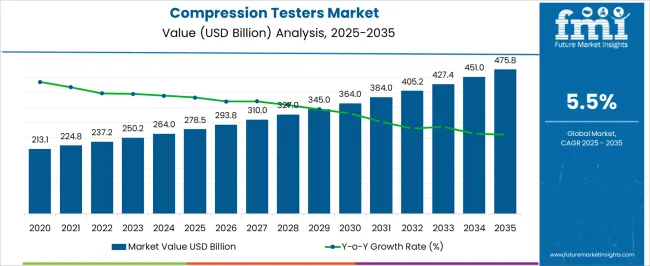
| Metric | Value |
|---|---|
| Compression Testers Market Estimated Value in (2025 E) | USD 278.5 billion |
| Compression Testers Market Forecast Value in (2035 F) | USD 475.8 billion |
| Forecast CAGR (2025 to 2035) | 5.5% |
The Compression Testers market is experiencing steady growth driven by the increasing need for precision testing in quality control processes across industrial and automotive sectors. The current market scenario is shaped by rising demand for high-accuracy testing instruments that can evaluate material performance under compressive stress conditions. In particular, the focus on ensuring component durability, safety, and compliance with international standards is driving adoption.
The future outlook for this market is largely influenced by technological advancements in automated testing, digital data acquisition, and integration with industrial IoT systems. Growing emphasis on material optimization, process standardization, and product reliability in manufacturing processes is expected to further boost the demand for compression testers.
Additionally, investments in research and development of new materials and composites are enhancing the requirement for precise bend and compression testing capabilities With industries aiming to reduce production failures, improve operational efficiency, and meet regulatory mandates, the market is poised for continued growth across both established and emerging regions.
The compression testers market is segmented by type, end use, product type, and geographic regions. By type, compression testers market is divided into Bend Testing, Spring Testing, and Crush Testing. In terms of end use, compression testers market is classified into Automotive Industry, Aerospace Industry, Construction Industry, Packaging Industry, Medical Devices Industry, Cosmetics Industry, Health Industry, Plastic And Rubber Industry, and Pharmaceuticals Industry. Based on product type, compression testers market is segmented into Between 500 To 1500 N, Below 500 N, and Above 1500 N. Regionally, the compression testers industry is classified into North America, Latin America, Western Europe, Eastern Europe, Balkan & Baltic Countries, Russia & Belarus, Central Asia, East Asia, South Asia & Pacific, and the Middle East & Africa.
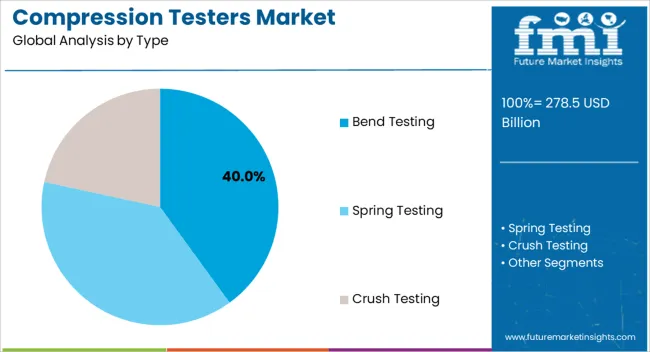
The Bend Testing type segment is projected to account for 40.00% of the Compression Testers market revenue in 2025, establishing it as the leading testing type. This prominence is being driven by its ability to provide accurate assessment of material flexibility and structural integrity, which is critical in industries such as automotive and construction. Adoption has been accelerated by the growing need for compliance with international quality and safety standards.
The flexibility of bend testing in evaluating a wide range of materials, including metals, composites, and polymers, has further reinforced its leadership. Additionally, automated bend testing systems offer improved repeatability, digital data capture, and reduced human error, which enhances reliability and operational efficiency.
The segment has benefited from widespread integration with production lines for real-time monitoring and early detection of material defects Future growth is expected to continue as manufacturers seek to optimize material usage, reduce wastage, and ensure higher product durability through precise bend testing methodologies.
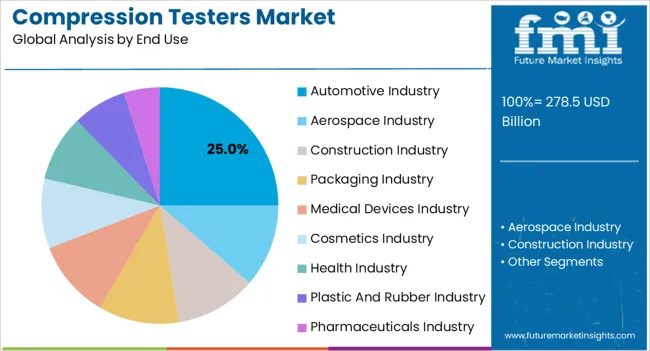
The Automotive Industry end-use segment is expected to hold 25.00% of the Compression Testers market revenue in 2025, making it the leading industry segment. This dominance is being supported by the high demand for rigorous material testing in automotive components, including chassis, body panels, and engine parts. The need to ensure component durability, occupant safety, and regulatory compliance has led to increased deployment of compression testing solutions in automotive manufacturing.
Furthermore, the rise in electric vehicle production, which involves new lightweight materials and composite structures, has intensified the requirement for precise testing under varying compressive loads. Integration of compression testers with automated production lines and digital quality management systems has enhanced efficiency and accuracy in automotive applications.
The segment has benefited from the growing emphasis on reducing production defects, optimizing material selection, and maintaining global safety standards With ongoing advancements in automotive technologies and stricter quality regulations, the commercial adoption of compression testing in the automotive industry is anticipated to sustain its leading position.
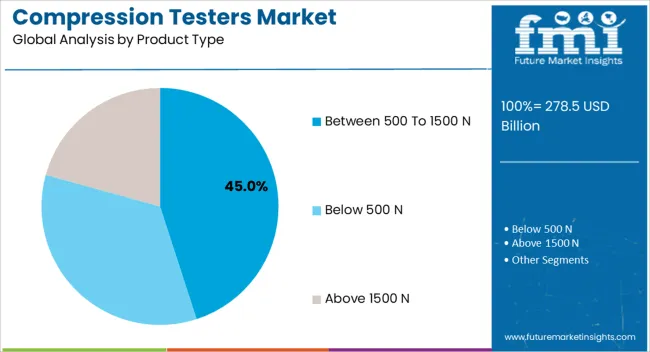
The Between 500 To 1500 N product type segment is projected to capture 45.00% of the Compression Testers market revenue in 2025, making it the most significant product category. This leadership is being driven by the widespread requirement for mid-range force testing capabilities that are suitable for a variety of materials and applications, including metals, plastics, and composites.
The segment’s growth has been enhanced by its adaptability in both laboratory and production environments, providing reliable and repeatable results. These testers are preferred due to their optimal balance between precision and capacity, allowing accurate evaluation without the need for oversized or overly complex equipment.
The segment has benefited from advancements in sensor technology and digital readout systems that improve measurement accuracy and data recording As manufacturers increasingly prioritize process standardization, material optimization, and product safety, the adoption of testers within the 500 to 1500 N range is expected to remain robust, maintaining its leadership position in the market.
Compression testers are used for testing the ability of a material to recover after a compressive external force is applied on it and the force is held on the material for a certain predefined time. The compression testers give various results such as load at rupture, maximum load on the material, deflection of material on the application of maximum load, work done at the maximum load, stiffness of material, stress on the material and strain conditions.
The design of compression testers should be such that the accurate results are obtained for the particular material in case of applied compression, transverse, shear testing etc.
The compression testers market is expected to witness significant growth in next few years due to the developing industrialization. Various properties of compression testers such as accuracy, precise repeatability, and high tolerance power make them preferred in various industries in the global market.
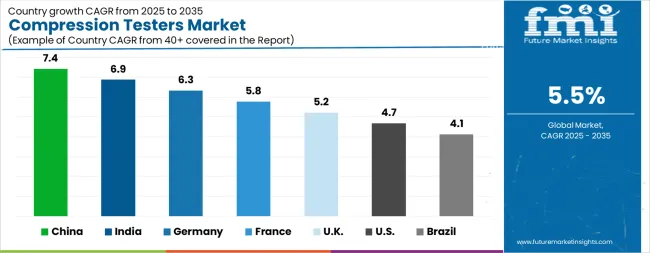
| Country | CAGR |
|---|---|
| China | 7.4% |
| India | 6.9% |
| Germany | 6.3% |
| France | 5.8% |
| UK | 5.2% |
| USA | 4.7% |
| Brazil | 4.1% |
The Compression Testers Market is expected to register a CAGR of 5.5% during the forecast period, exhibiting varied country level momentum. China leads with the highest CAGR of 7.4%, followed by India at 6.9%. Developed markets such as Germany, France, and the UK continue to expand steadily, while the USA is likely to grow at consistent rates. Brazil posts the lowest CAGR at 4.1%, yet still underscores a broadly positive trajectory for the global Compression Testers Market. In 2024, Germany held a dominant revenue in the Western Europe market and is expected to grow with a CAGR of 6.3%. The USA Compression Testers Market is estimated to be valued at USD 96.4 billion in 2025 and is anticipated to reach a valuation of USD 152.2 billion by 2035. Sales are projected to rise at a CAGR of 4.7% over the forecast period between 2025 and 2035. While Japan and South Korea markets are estimated to be valued at USD 13.8 billion and USD 8.4 billion respectively in 2025.
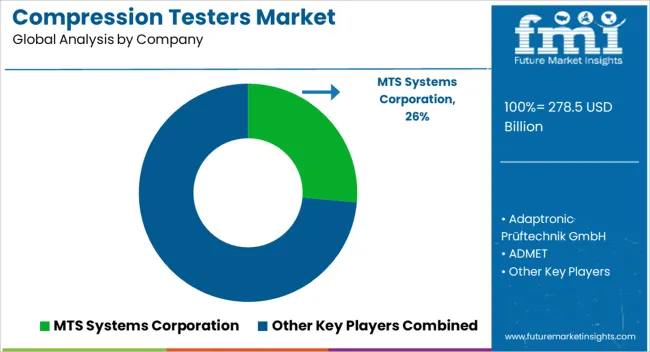
| Item | Value |
|---|---|
| Quantitative Units | USD 278.5 Billion |
| Type | Bend Testing, Spring Testing, and Crush Testing |
| End Use | Automotive Industry, Aerospace Industry, Construction Industry, Packaging Industry, Medical Devices Industry, Cosmetics Industry, Health Industry, Plastic And Rubber Industry, and Pharmaceuticals Industry |
| Product Type | Between 500 To 1500 N, Below 500 N, and Above 1500 N |
| Regions Covered | North America, Europe, Asia-Pacific, Latin America, Middle East & Africa |
| Country Covered | United States, Canada, Germany, France, United Kingdom, China, Japan, India, Brazil, South Africa |
| Key Companies Profiled | MTS Systems Corporation, Adaptronic Prüftechnik GmbH, ADMET, Aerotest Limited, Airmo Technologies, Akira Technologies, Bauer Compressors, and Dewetron GmbH |
The global compression testers market is estimated to be valued at USD 278.5 billion in 2025.
The market size for the compression testers market is projected to reach USD 475.8 billion by 2035.
The compression testers market is expected to grow at a 5.5% CAGR between 2025 and 2035.
The key product types in compression testers market are bend testing, spring testing and crush testing.
In terms of end use, automotive industry segment to command 25.0% share in the compression testers market in 2025.






Our Research Products

The "Full Research Suite" delivers actionable market intel, deep dives on markets or technologies, so clients act faster, cut risk, and unlock growth.

The Leaderboard benchmarks and ranks top vendors, classifying them as Established Leaders, Leading Challengers, or Disruptors & Challengers.

Locates where complements amplify value and substitutes erode it, forecasting net impact by horizon

We deliver granular, decision-grade intel: market sizing, 5-year forecasts, pricing, adoption, usage, revenue, and operational KPIs—plus competitor tracking, regulation, and value chains—across 60 countries broadly.

Spot the shifts before they hit your P&L. We track inflection points, adoption curves, pricing moves, and ecosystem plays to show where demand is heading, why it is changing, and what to do next across high-growth markets and disruptive tech

Real-time reads of user behavior. We track shifting priorities, perceptions of today’s and next-gen services, and provider experience, then pace how fast tech moves from trial to adoption, blending buyer, consumer, and channel inputs with social signals (#WhySwitch, #UX).

Partner with our analyst team to build a custom report designed around your business priorities. From analysing market trends to assessing competitors or crafting bespoke datasets, we tailor insights to your needs.
Supplier Intelligence
Discovery & Profiling
Capacity & Footprint
Performance & Risk
Compliance & Governance
Commercial Readiness
Who Supplies Whom
Scorecards & Shortlists
Playbooks & Docs
Category Intelligence
Definition & Scope
Demand & Use Cases
Cost Drivers
Market Structure
Supply Chain Map
Trade & Policy
Operating Norms
Deliverables
Buyer Intelligence
Account Basics
Spend & Scope
Procurement Model
Vendor Requirements
Terms & Policies
Entry Strategy
Pain Points & Triggers
Outputs
Pricing Analysis
Benchmarks
Trends
Should-Cost
Indexation
Landed Cost
Commercial Terms
Deliverables
Brand Analysis
Positioning & Value Prop
Share & Presence
Customer Evidence
Go-to-Market
Digital & Reputation
Compliance & Trust
KPIs & Gaps
Outputs
Full Research Suite comprises of:
Market outlook & trends analysis
Interviews & case studies
Strategic recommendations
Vendor profiles & capabilities analysis
5-year forecasts
8 regions and 60+ country-level data splits
Market segment data splits
12 months of continuous data updates
DELIVERED AS:
PDF EXCEL ONLINE
Compression Product Market Size and Share Forecast Outlook 2025 to 2035
Compression Garments Market Size and Share Forecast Outlook 2025 to 2035
Compression Testing Machines Market Size and Share Forecast Outlook 2025 to 2035
Compression Garments and Stockings Market Analysis - Size, Share, and Forecast 2025 to 2035
Compression Baggers Market Size and Share Forecast Outlook 2025 to 2035
Compression Gas Spring Market Analysis - Size, Share, and Forecast Outlook 2025 to 2035
Compression Veterinary Bandages Market Trends – Growth & Forecast 2025 to 2035
Market Share Insights for Compression Baggers Providers
Industry Share Analysis for Compression Packing Providers
Compression Therapy Market Insights – Growth & Forecast 2024-2034
Compression Bags Market
Decompression Toys Market Growth - Trends & Forecast 2025 to 2035
Box Compression Tester Market Size and Share Forecast Outlook 2025 to 2035
Radial Compression Devices Market Growth - Trends & Forecast 2025 to 2035
Distal Compression Plates Market
Artery Compression Devices Market
Colon Decompression Kits Market
Abdominal Compression Garments Market Size and Share Forecast Outlook 2025 to 2035
India Static Compression Therapy Market Report – Trends & Forecast 2016-2026
Pump Testers Market Size and Share Forecast Outlook 2025 to 2035

Thank you!
You will receive an email from our Business Development Manager. Please be sure to check your SPAM/JUNK folder too.
Chat With
MaRIA